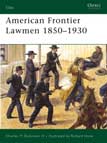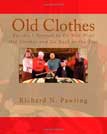

In the 1840s, gold had officially been discovered in California, and many men made their way out West in search of riches. The early mining camps were dangerous places full of violence and crime. Law and order was needed, and the Vigilante Committee became the first organized deliverer of justice in these turbulent new towns. As more and more people headed out West, and many new towns sprang up, a more official system of law was needed. From the days of the California Gold Rush to the killing of Bill Tilghman, the last of the traditional frontier lawmen, this book discusses the men that shaped law and order in the 'Wild, Wild West'.
This book is an indispensable guide to the often misunderstood field of living history. It presents the actuality that there is a great deal more involved in this discipline than merely “wearing old clothes and going back to the past.” This volume succinctly captures the perspectives that Richard Pawling has gained from over thirty-five years of experience in the interpretive profession (in county, state and national parks and as entrepreneur and owner of Rich Pawling’s History Alive!). Here, Pawling shares his observations and advice about everything from designing a living history persona to his successful use of this provocative teaching technique in the college classroom, to the role of research in helping you to learn about your own genealogical past. Though written for a broad audience, this book should be of particular interest to those employed as an interpretive park ranger or a naturalist, a museum or tour guide, or those who volunteer as a military reenactor or as a docent at a park, museum or historic site. Old Clothes presents the important lessons Pawling has learned along the way, the most important of which is that “life is a journey and understanding our past plays an important role in helping us to continue to learn not only about life in general, but more importantly, about ourselves.”
Maximilian I assumes imperial title without being crowned
Robert Dudley, Earl of Leicester, becomes Governor of Neth
Tycho Brahe and Johannes Kepler meet for 1st time near Prague
Oliver Cromwell grants residency to Luis Caravajal
3 VOC-ships anchor at Dirk-Hartogeiland, Australia
350 rebellious Streltsi executed in Moscow
British garrison surrenders to French and Spanish fleet
Worst quake in 8 years kills some 50,000 (Calabria, Italy)
1st Anglican bishops of New York and Pennsylvania consecrated in London
1st electoral college chooses Washington and Adams as President and VP
French National Convention proclaims abolishment of slavery
Earthquake in Quito, Ecuador kills 41,000
William Dunlap, adapts French melodrama "Voice of Nature"
Free American Blacks settle Liberia, West Africa
J W Goodrich introduces rubber galoshes to public
Mormons leave Nauvoo, Mo for settlement in west
1st US telegraph co established in Maryland
University of Wisconsin begins in 1 room with 20 students
Alvan Bovay proposes name "Republican Party, " Ripon, Wisc
Soldiers shoot Jewish families in Coro, Venezuela
Confederate constitutional convention meets for 1st time, Montgomery Alabama: Georgia, Florida, Louisiana, Mississippi and South Carolina elect Jefferson Davis President of Confederacy
24th Amendment abolishes Poll tax
Skirmish at Big Black River Bridge, Mississippi
Hawaiian Board of Education formed
Robert E Lee is named commander-in-chief of Confederate Army
Mary Baker Eddy cures her injuries by opening a bible
Princess Louise marries Prince Philip von Saksen-Coburg-Gotha in Belg
Interstate Commerce Act authorizes federal regulation of railroads
1st rolling lift bridge opens, Chicago
Revolt against US occupation of Philippines
Stanley Cup: Montreal AAA beat Winn Victorias, 2 games to 1 and 1 tie
John Millington Synges "Well of Saints, " premieres in Dublin
Louis Perlman patents demountable auto tire-carrying wheel rim
National Institute of Arts & Letters founded
US Congress approves Burnett-anti-immigration law
Experiments to find cause of pellagra begin at Miss Penitentiary
Belgium Council of Flanders established
WGY-AM in Schenectady New York begins radio transmissions
1st Winter Olympic games close at Chamonix France
Austrian chancellor Seipel wants to join Germany
KGA-AM in Spokane WA begins radio transmissions
1st tieless, soundless, shockless streetcar tracks, New Orleans
National League adopts a deader baseball
3rd Winter Olympic games open in Lake Placid, New York
Japanese troop occupy Harbin, Manchuria
German President Von Hindenburg limits freedom of the press
1st radioactive substance produced synthetically (radium E)
Jim Margie, Philadelphia, bowls 900 in 3 (unsanctioned) games
"Our Town, " by Thornton Wilder opens on Broadway
Hitler seizes control of German army and puts Nazi in key posts
Glenn Cunningham (top miler) says 4-min mile beyond human effort
British tanks occupy Maus Libya
Former Dutch Premier De Geer flies to Berlin
United Service Organization (USO) founded
Clinton Pierce becomes 1st US general wounded in action in WWII
US 7th Infantry Division captures Kwajalein
FDR, Churchill and Stalin meet at Yalta
Sri Lanka (formerly Ceylon) declares independence from the UK
Failed assassination attempt on Shah of Persia
US female Figure Skating championship won by Sonya Klopfer
US male Figure Skating championship won by Richard Button
1st black executive of a major TV station (Jackie Robinson-WNBC NY)
AL plans to test automatic intentional walk during spring training
1st electric portable typewriter placed on sale (Syracuse NY)
"Oh, Captain!" opens at Alvin Theater NYC for 192 performances
Hall of Fame fails to elect anyone for 1st time since 1950
Israel begins exporting copper ore
BBWAA voters fail to elect a new Hall of Fame member
Giants move their offices to Candlestick Park
Sputnik 7 launches into Earth orbit; probable Venus probe failure
"Gay Life" closes at Shubert Theater NYC after 113 performances
Russian newspaper Izvestia reports baseball is an old Russian game
US female Figure Skating championship won by Barbara Roles
US male Figure Skating championship won by Monty Hoyt
Amendment 24 outlaws poll tax
FAA begins 6 month test of reactions to sonic booms over Okla City
All-Nippon Airways 727 crashes off Haneda Airport (Japan); kills 133
"Wild Thing" hits #20 on the pop singles chart by Senator Bobby
US launches Lunar Orbiter 3
"Golden Rainbow" opens at Shubert Theater NYC for 355 performances
Bowie Kuhn replaces William Eckert as 5th commissioner of baseball
41,163, then largest NBA crowd, watches doubleheader Cin-Det, SD-Bost
Beatles appoint Eastman and Eastman, as general cousel to Apple
Yassar Arafats takes over as Chairman of PLO
"Charles Aznavour" opens at Music Box Theater NYC for 23 performances
"Gantry" opens at George Abbott Theater NYC for 1 performance
Apollo 14 lander Antares lands on Moon (Shepard & Mitchell)
Baseball announces a special hall of fame wing for blacks
British car maker Rolls Royce declared itself bankrupt
Government exhibit under construction collapses, kills 65 in Brazil
National Guard mobilized to quell rioting in Wilmington, North Carolina
6th round of Strategic Arms Limitation Talks ends in Vienna Austria
Sen Strom Thurmond suggests John Lennon be deported
"No, No Nanette" closes at 46th St. Theater NYC after 861 performances
Islanders and Sabres had a penalty free game
Manfred Kokot runs world record 50m indoor (5.61 seconds)
Benzine rationing ends in the Netherlands
Gas rationing ends in the Netherlands
Patricia Hearst (19) kidnapped by Symbionese Liberation Army
12th Winter Olympic games opens in Innsbruck, Austria
7.5 earthquake kills 22,778 in Guatemala and Honduras
30th NHL All-Star Game: Wales beat Campbell 4-3 at Vancouver
Elevated train jumps track, crashes onto Chicago St. (11 die, 200 hurt)
"Co-Ed Fever, " TV Comedy, debut and cancelled that outing on CBS
End of last 3+day D / N game for 15 yrs (WSC, SCG)
Joanne Carner wins LPGA Colgate Triple Crown Golf Tournament
Bani Sadr sworn in as Premier of Iran
Joanne Carner wins LPGA Whirlpool Golf Championship of Deer Creek
"Pump Boys & Dinettes" opens at Princess Theater NYC for 573 performances
Indoor distance record for a paper airplane (47m) Tacoma Washington
Musical "Pump Boys & Dinettes, " premieres in New York City
Suriname Premier Chin A Sen flees
Jose Happart becomes Mayor of Voeren Belgium
US male Figure Skating championship won by Scott Hamilton
"9" closes at 46th St. Theater NYC after 739 performances
"Backstage Magic" opens at CommuniCore
Frank Aquilera sets world frisbee distance record (168m) Las Vegas
20 countries (but not US) sign UN treaty outlawing torture
Naval exercises canceled when US refuses to tell New Zealand of nuclear weapons
38th NHL All-Star Game: Wales beat Campbell 4-3 (OT) at Hartford
Israeli fighters intercept Libyan liner (passenger plane)
Sacramento Kings score only 4 points 1st quarter against Lakers; fewest in a period since introduction of 24 second shot-clock in 1954
Panamanian leader Manuel Noriega indicted on drug charges
Dean Jones scores 216 vs. WI at the Adelaide Oval
10 Israeli tourists murdered near Cairo
Anders Holmertz swims world record 400 m freestyle (3:40.81)
Danny Everett runs world record 400m indoor (45:04)
Lyudmila Narozhi-Lenko runs world record 60m hurdles indoor (7.69)
NFL Pro Bowl: NFC beats AFC 27-21
Pat Bradley wins Oldsmobile LPGA Golf Classic
St. Petersburg Pelicans beat West Palm Beach Tropics 12-4 to win 1st Senior Professional Baseball Association Championship
Martin Crowe and Andrew Jones make 467 stand vs. SL, world record
US postage raises from 25 cents to 29 cents
Admiral Studeman, ends term as acting Director of CIA
Marge Schott suspended from baseball for 1 year due to racism
10th Soap Opera Digest Awards - Days of Our Live wins
20 die in armed assault on mosque in Khartum Sudan
Merlene Ottey runs world record 50 m indoor (6.00 seconds)
Russian team beats ladies world record 4x800 m indoor (8:18.71)
Sandra Volker swims female European record 50m backstroke (27.77)
NFL Pro Bowl: NFC beats AFC 20-13
Sec of State Margaret Albright announces she just discovered that her grandparents were Jewish
73 Israelis die when army copters collide
Mario LeMieux is 7th NHL player to score 600 goals
OJ Simpson found libel in murders of Ron Goldman and Nicole Simpson
Bill Gates gets a pie thrown in his face in Brussels Belgium

